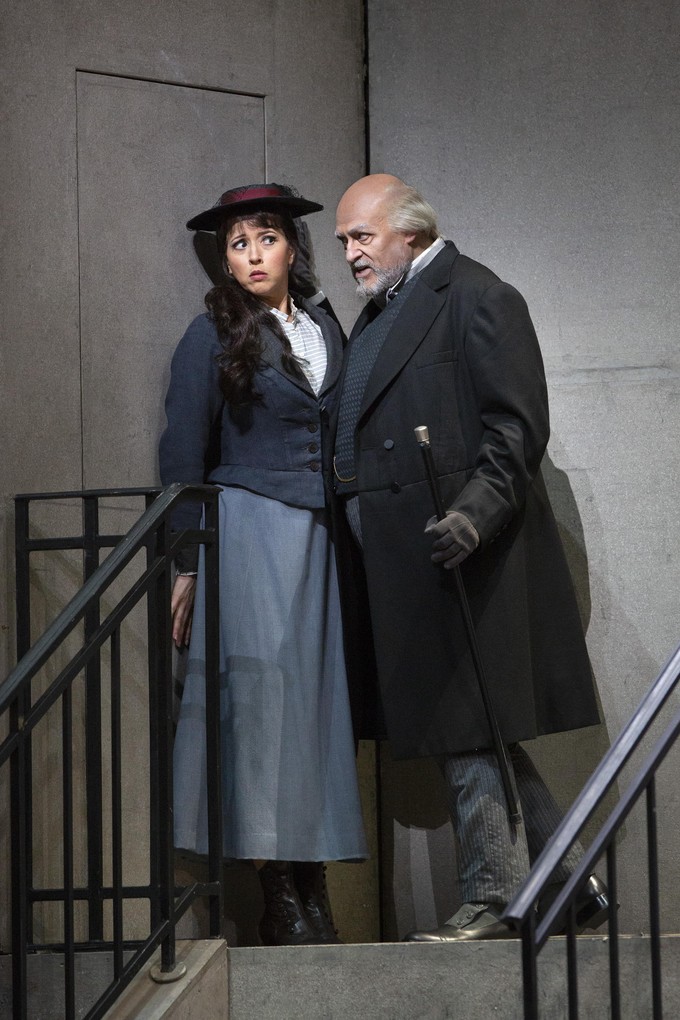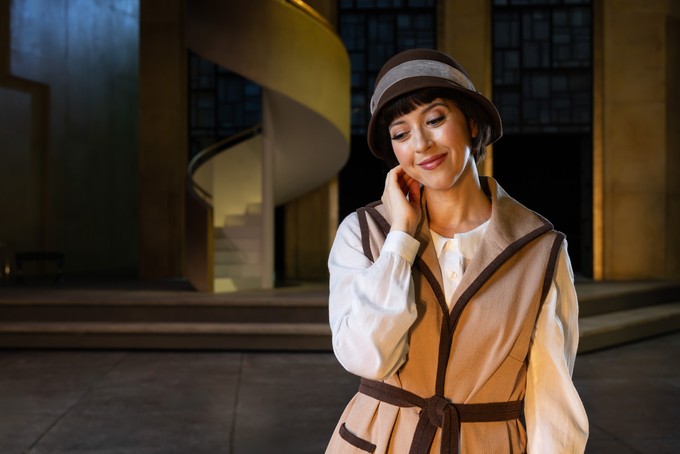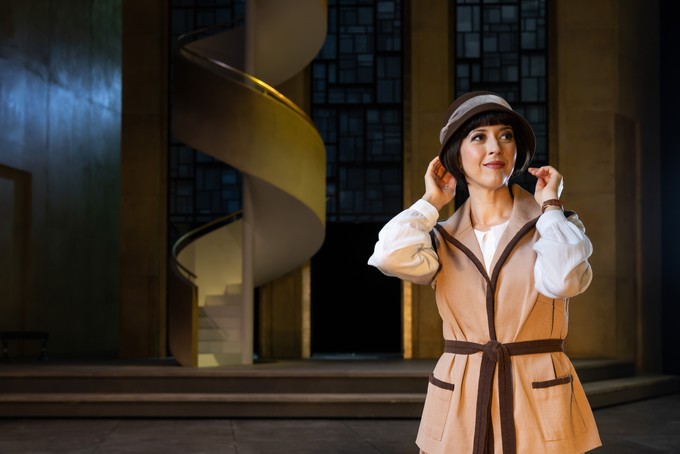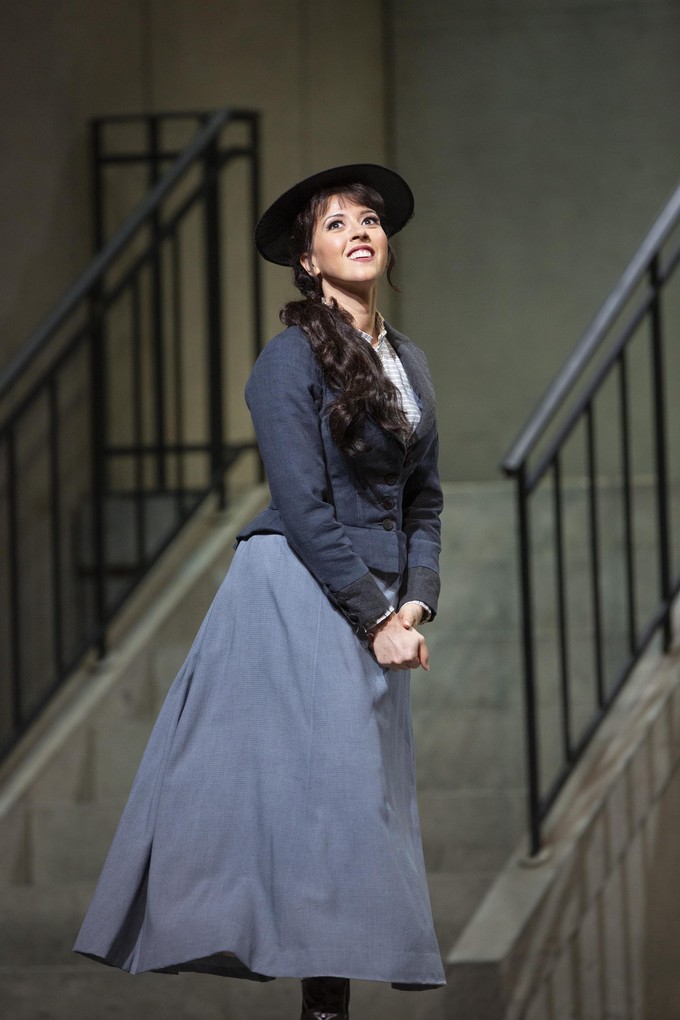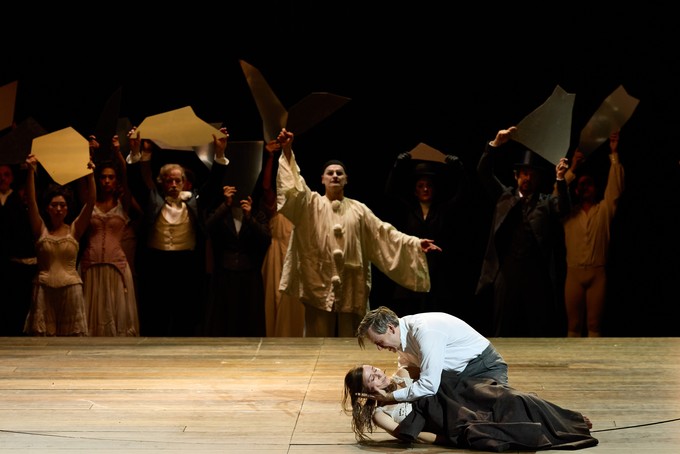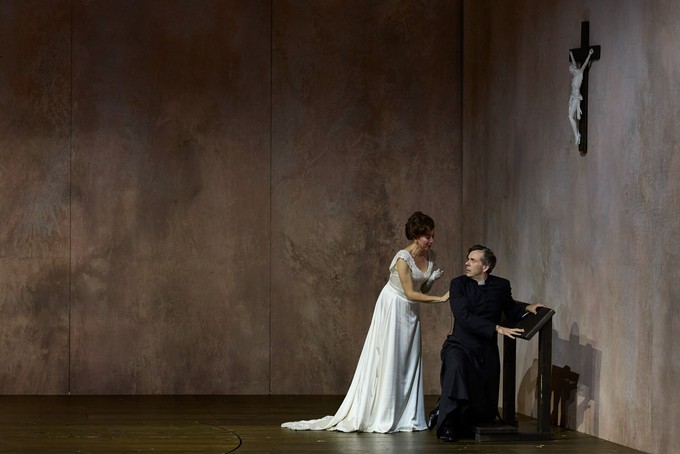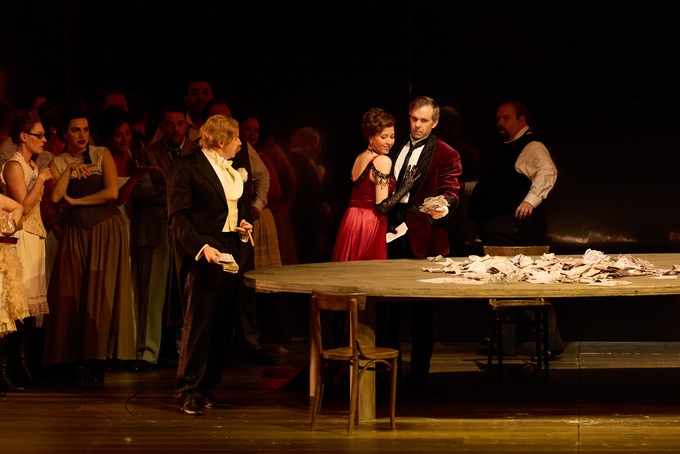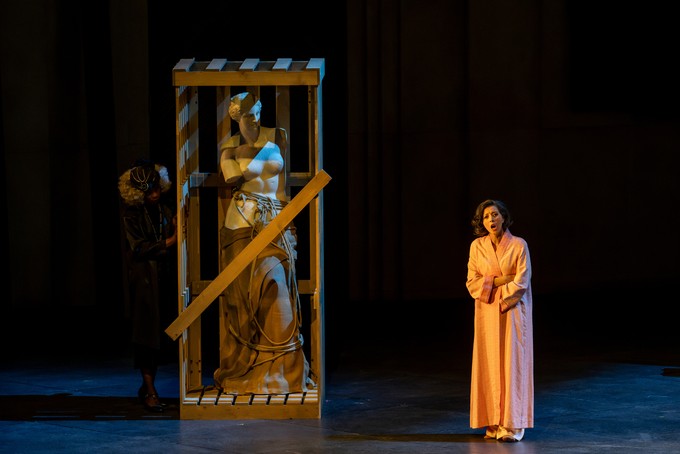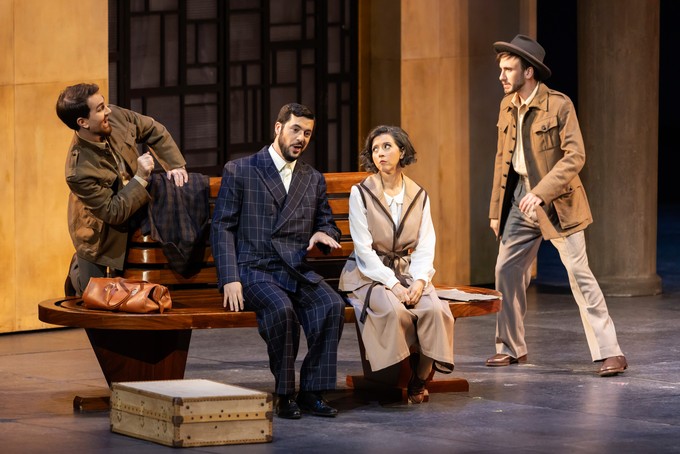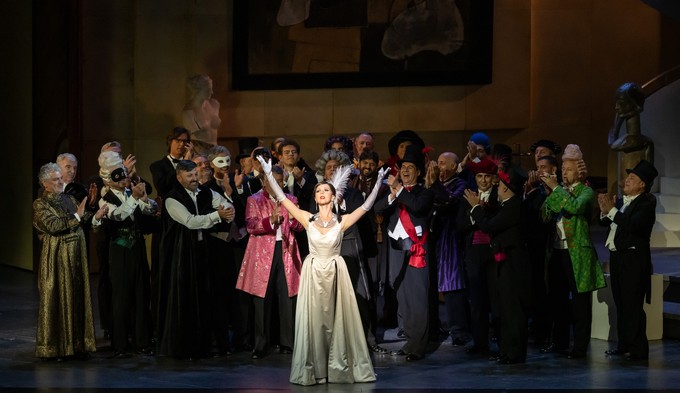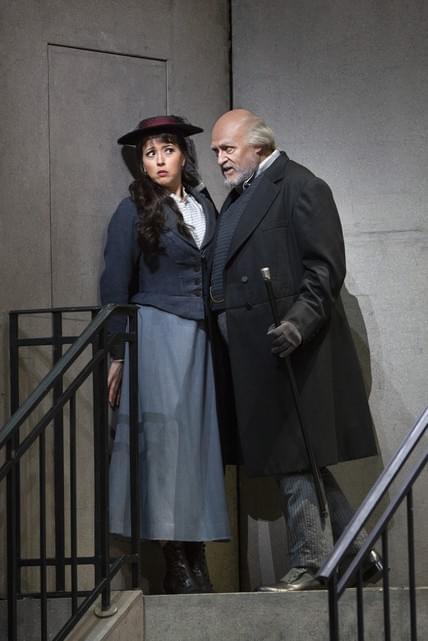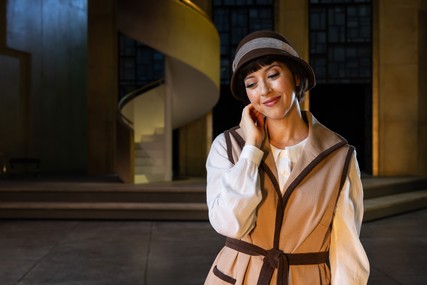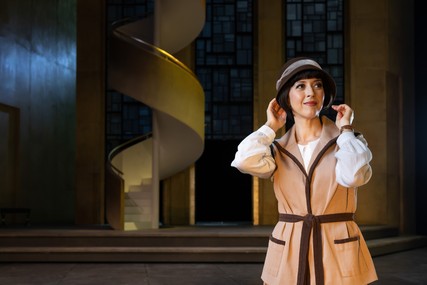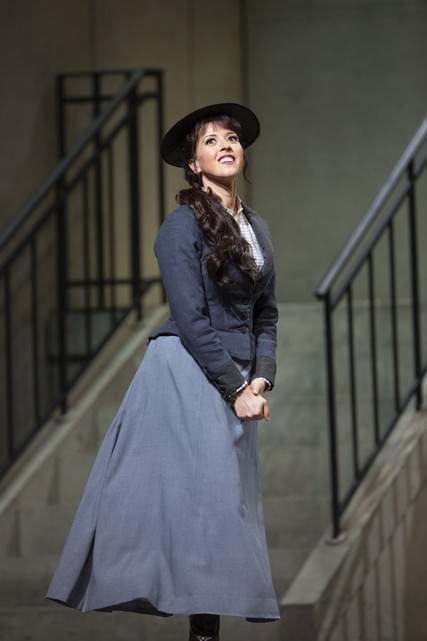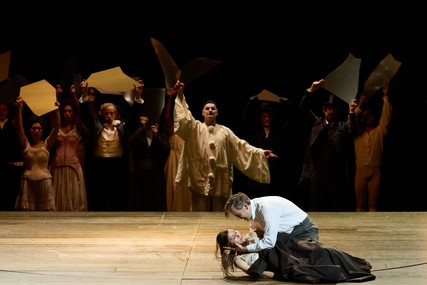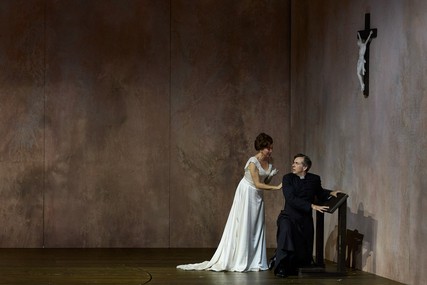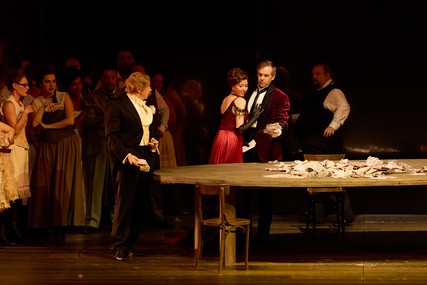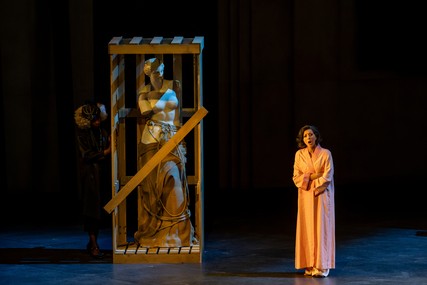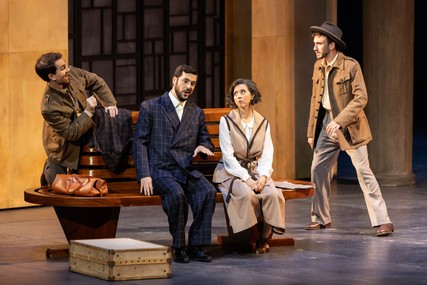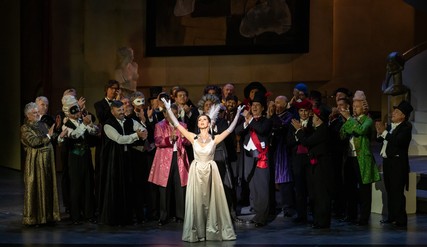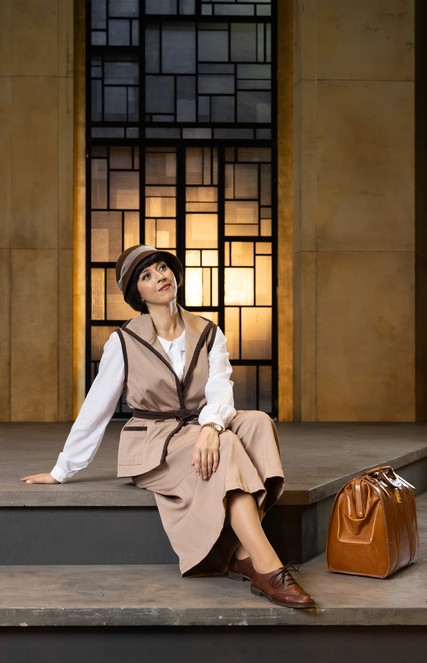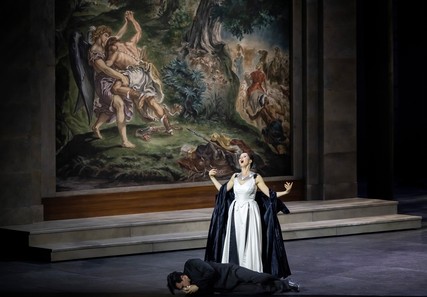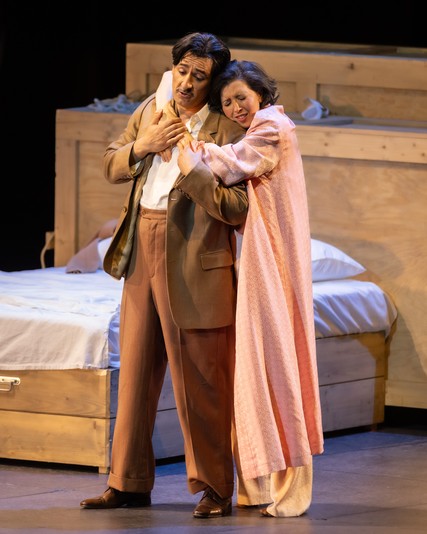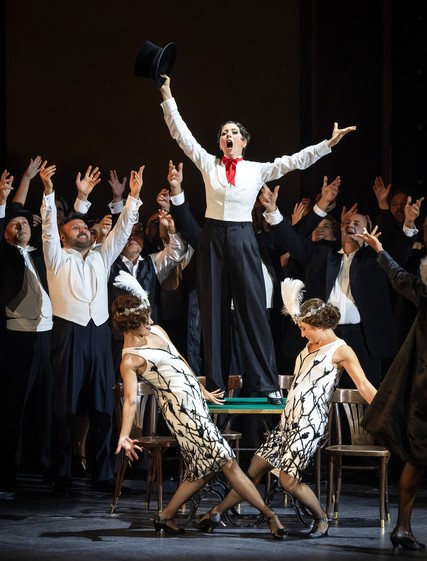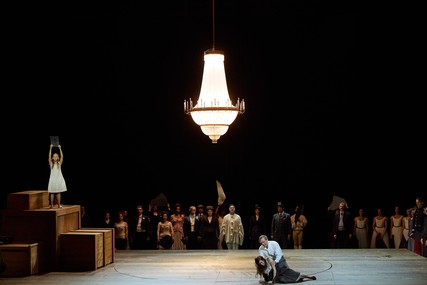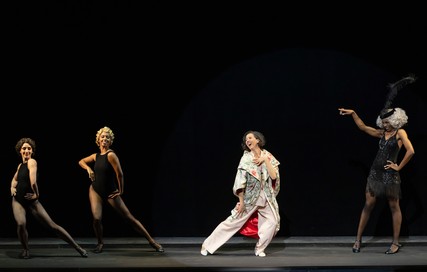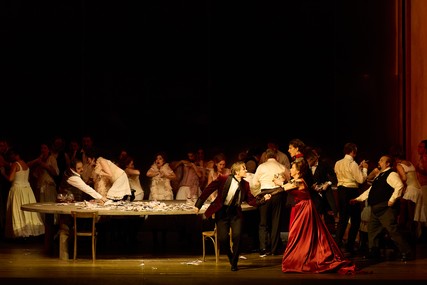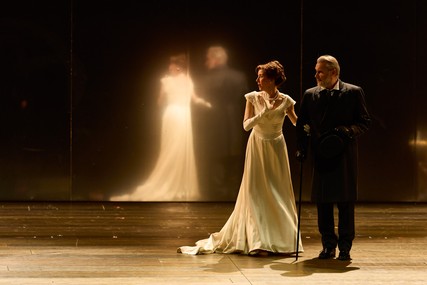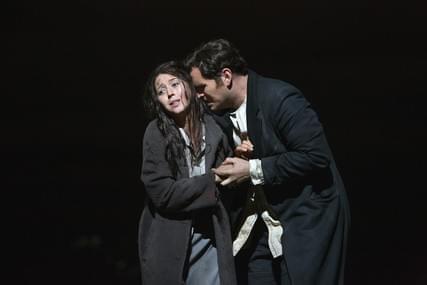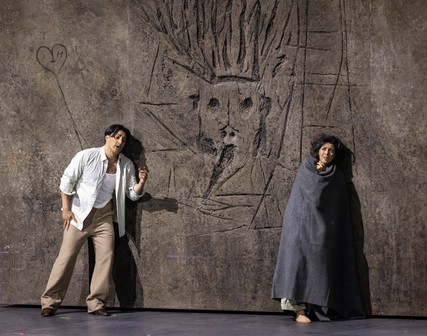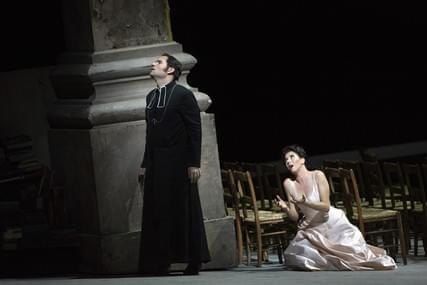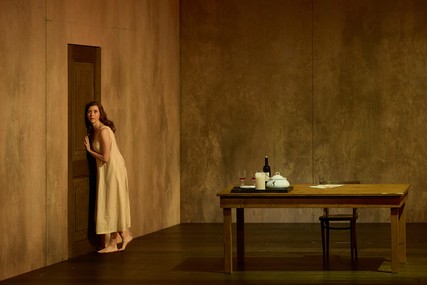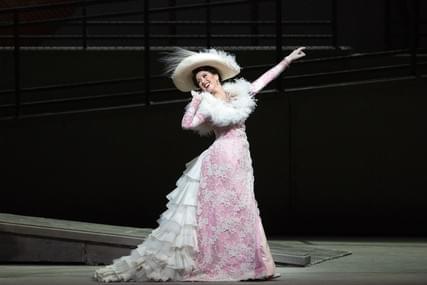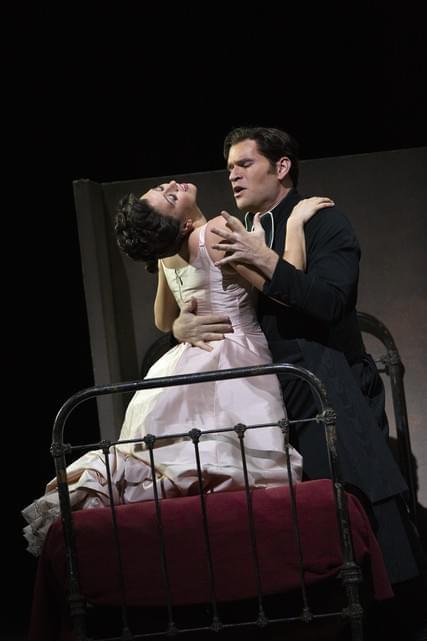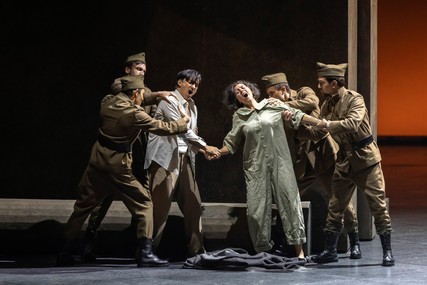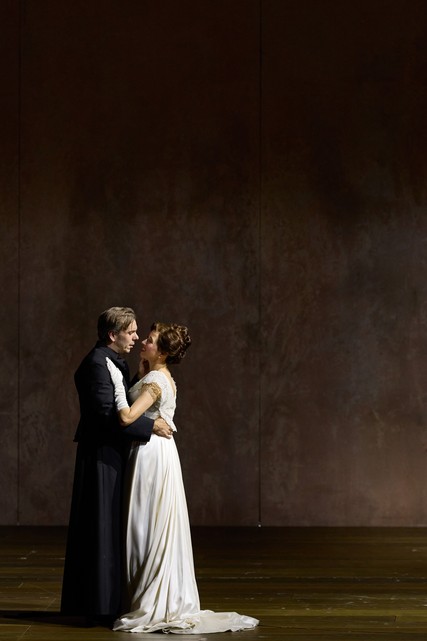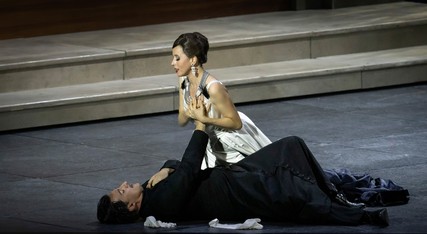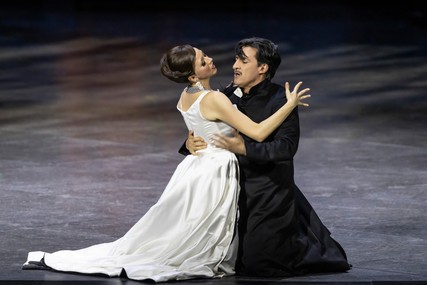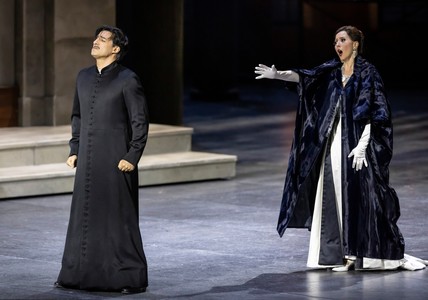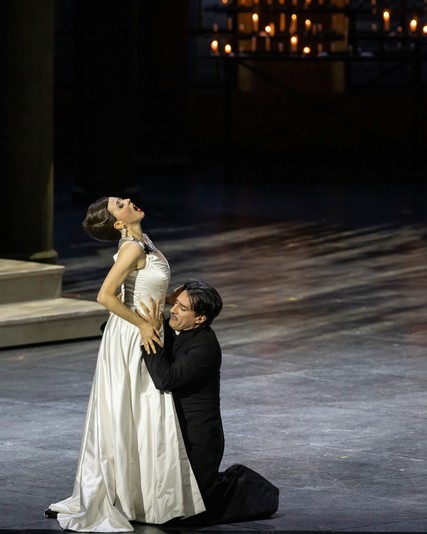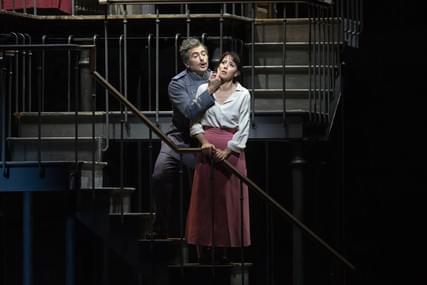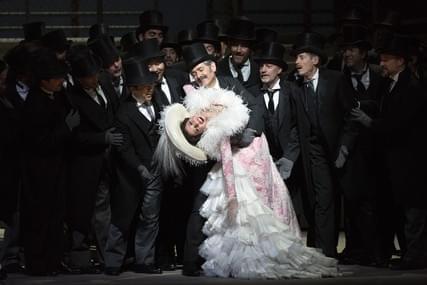Manon in Manon
Lisette Oropesa's portrayal of Manon has garnered widespread acclaim for its depth, versatility, and emotional resonance. Critics consistently highlight her ability to embody the multifaceted nature of the character, seamlessly transitioning through a wide spectrum of emotions such as innocence, desire, and resignation. Her expressiveness, described as nuanced and extensive yet restrained, allows her to connect deeply with audiences, making her performances both visually and emotionally engaging. The reviews emphasize her capacity to captivate with a mix of youthful exuberance and mature depth, which is fundamental for a character as complex as Manon.
Oropesa's vocal prowess is another focal point of praise, with reviewers noting her round, velvety timbre and the expansion of her middle range. Her performance is said to shine in both technical agility and emotional delivery, particularly noted in her entrance aria which showcases her voice's depth and projection. Critics admire her ability to deliver high notes with precision and agility, essential for the demands of the role. Her interpretation is described as both dreamy and grounded, marked by a directness and freshness that captures the essence of Manon's character—a young woman caught in the whirlwind of her desires and the consequences they bring.
In addition to her vocal and emotional interpretation, Oropesa's stage presence has been highlighted as a key component of her success in this role. Her ability to move across the stage with fluidity and purpose enhances her portrayal, creating a fully realized character that is both relatable and compelling. The combination of her refined technique, expressive depth, and dynamic stagecraft positions her as an ideal performer for the role, making her Manon both memorable and transformative. This synthesis of talents underscores why she is considered a definitive interpreter of the character, capable of bringing new dimensions to a classic role.
Lisette has been reviewed 35 times in this role.
Role Information
- Composer: Jules Massenet
- Opera: Manon
- Performances: 17
- Reviews: 35
- Venues: 3
- Organizations: 3
- Years: 2019 - 2025
Incarnating a Manon initially youthful and mischievous, then a self-assured woman of the world aware of her charms, Lisette Oropesa displays a superb timbre and demonstrates great vocal agility, excelling in virtuosic passages. However, far from limiting herself to mere technical prowess, the soprano infuses a dazzling dramatic dimension into her interpretation, capable of conveying all the character's emotions, navigating…
Incarnating a Manon initially youthful and mischievous, then a self-assured woman of the world aware of her charms, Lisette Oropesa displays a superb timbre and demonstrates great vocal agility, excelling in virtuosic passages. However, far from limiting herself to mere technical prowess, the soprano infuses a dazzling dramatic dimension into her interpretation, capable of conveying all the character's emotions, navigating between moments of pure bel canto and expressing the dramatic turmoil of Manon.
— Concerto Net, October 2025
Since her first appearance, the American soprano showcased a round and luminous timbre in the entrance aria, while the tenor unfolded a phrase of impeccable purity. The duet "À Paris, nous irons" confirmed their chemistry: she with playful lightness; he with elegant complicity. Oropesa's "Adieu, notre petite table" stood out for impeccably sustained phrasing, with generous breath support and dynamic…
Since her first appearance, the American soprano showcased a round and luminous timbre in the entrance aria, while the tenor unfolded a phrase of impeccable purity. The duet "À Paris, nous irons" confirmed their chemistry: she with playful lightness; he with elegant complicity. Oropesa's "Adieu, notre petite table" stood out for impeccably sustained phrasing, with generous breath support and dynamic control that brought the emotion to an intimate and overwhelming intensity. Bernheim immediately responded with "En fermant les yeux," unfolding a homogeneous and perfectly supported vocal line, with well-regulated pianos and subtle falsetto touches that reinforced the dreamlike character of the piece. In the Cours-la-Reine scene, Oropesa dazzled in "Obéissons quand leur voix appelle" with textbook coloratura, perfectly embedded trills, and a line of great distinction that made every melodic arabesque shine; and, without losing a bit of freshness, she culminated with a Gavotte of authentic French school, light and dancing.
— Opera Actual, September 2025
As Manon, Oropesa's art is fickle and versatile, in addition to being direct, fresh, and young. Without twists or half-measures. Soaked in the past and unreserved about the uncertainty of the future. Manon in body and soul. The soprano embodied the character and its complex vocal nature. Genuine and unique. Different from Janine Micheau, Victoria, Cotrubas, and so many other…
As Manon, Oropesa's art is fickle and versatile, in addition to being direct, fresh, and young. Without twists or half-measures. Soaked in the past and unreserved about the uncertainty of the future. Manon in body and soul. The soprano embodied the character and its complex vocal nature. Genuine and unique. Different from Janine Micheau, Victoria, Cotrubas, and so many other great Manons in history, but close to the same Olympus. In the second act, she confronted the opera's most famous aria, "Adieu, notre petite table," with transparency, nostalgia, and impeccable vocal purity, in contrast to a gracefully rounded "Je marche sur tous les chemins" (third act) with 18th-century flavors in the famous gavotte "Obéisons quand leur voix appelle," when she resumes the youthful joys of love and youth. Manon Oropesa. Cuban, American and, above all, as French as Massenet's music.
— Scherzo Magazine, October 2024
Manon is her finest role to date, her clear, flexible soprano perfectly suited to Massenet’s blend of text-driven lyricism with the occasional burst of coloratura. From her breathless first entry full of wide-eyed charm to her final desperate gasp in the middle of Thomas’s endless highway to hell, she charts a clear path that ensures our engagement even as we…
Manon is her finest role to date, her clear, flexible soprano perfectly suited to Massenet’s blend of text-driven lyricism with the occasional burst of coloratura. From her breathless first entry full of wide-eyed charm to her final desperate gasp in the middle of Thomas’s endless highway to hell, she charts a clear path that ensures our engagement even as we vacillate between sympathy and condemnation. Each of her arias is a carefully contrasted gem, from the ditzy chit of Act I’s Je suis encore tout étourdie, to the double whammy of her Act III showpiece Je marche sur tous les Chemins with its following coloratura gavotte. By contrast, her famous Adieu, notre petite table is simple, yet profound.
— Limelight Magazine, October 2019
Lisette Oropesa, making her role debut as Manon, sang with an elegance and style that was perfect for a heroine with little control over her fate. Her French diction was incisive and clear, and her high notes soared into a long and sustained arc. As much as she thrilled with her beautiful singing.
Lisette Oropesa, making her role debut as Manon, sang with an elegance and style that was perfect for a heroine with little control over her fate. Her French diction was incisive and clear, and her high notes soared into a long and sustained arc. As much as she thrilled with her beautiful singing.
— Bachtrack, September 2019
Oropesa is in top form. She adapted to all the emotional registers demanded by the character (innocence, freshness, mischief, desire, doubt, melancholy, extravagance, fear, ecstasy, pride, resignation, consumption...) with powerful vocal abilities and remarkable stage presence. Extremely secure in all registers, homogeneous, subtle and robust, decisive, exquisitely nuanced, always vibrant, her voice was a luxury that filled every corner of…
Oropesa is in top form. She adapted to all the emotional registers demanded by the character (innocence, freshness, mischief, desire, doubt, melancholy, extravagance, fear, ecstasy, pride, resignation, consumption...) with powerful vocal abilities and remarkable stage presence. Extremely secure in all registers, homogeneous, subtle and robust, decisive, exquisitely nuanced, always vibrant, her voice was a luxury that filled every corner of the main hall of Les Arts. At one point, I thought an encore was about to ensue. These things are hard to explain why they happen sometimes and not at others (well, sometimes there are reasons).
— Mundo Classico, October 2024
Manon in the “roaring twenties”. Art Deco. The Kardashians. “One of the few operas where man is the victim and the tenor is not jealous.” Beyond the chatter, musings, interpretations, and stage reinterpretations, what remains of Massenet's opera Manon’s return to the Palau de Les Arts - having last been heard in 2010, during the time of Helga Schmidt -…
Manon in the “roaring twenties”. Art Deco. The Kardashians. “One of the few operas where man is the victim and the tenor is not jealous.” Beyond the chatter, musings, interpretations, and stage reinterpretations, what remains of Massenet's opera Manon’s return to the Palau de Les Arts - having last been heard in 2010, during the time of Helga Schmidt - is the essence of one of the great operas in the repertoire; that is, the singing and its symphonic foundation. It was precisely Cuban-American soprano Lisette Oropesa and the Orchestra of the Valencian Community who were the true winners of a performance filled with contrasts and quality, made unforgettable by the singing and the exceptional expression of the diva, and an orchestra that played, sang, and sounded wonderfully throughout the night under the effective leadership of its principal conductor, James Gaffigan. From the first moments, - “Je suis encore tout étourdie”-, Oropesa defined the expressive and vocal outlines of a character that fits her like a glove, both musically and dramatically. Despite her powerful personality and her status as a leading figure in contemporary opera, in her interpretation, she was solely Manon, the genuine and unique. She did not play Manon: it was as if Manon herself sang and acted on the immense stage of the Palau de Les Arts on that Thursday. Such was her commitment, identification with the character, and vocal core of a role marked by legendary opera figures, with Victoria de los Ángeles leading the way. Oropesa, who debuted the role in 2019, at the Metropolitan Opera in New York, adds her name to the select list of the best Manons that were and are. She sang from the soul, giving meaning and expression to every word, every syllable, to the evolution of a nearly 16-year-old girl, capricious and Lolita-like, who after five acts and six scenes ends up transformed into a heroine of love and freedom. And it was this difficult transition, from naivety and frivolity to a passion capable of setting aside all dreams and longings of yesteryears to let love impose its law in difficult times and against any convenience, that guided a night in which she was the absolute protagonist. The chasm between the whimsical young girl and the heroine who ends the story with that intense and simple phrase that escapes her dying lips: “Et c’est là l’histoire de Manon Lescaut.” Earlier, there were such memorable moments as when in the second act she sings the most famous aria “Adieu, notre petite table” with a transparent vocal subtlety full of effusion and nostalgia; or the contrast, in the frivolous third act, with a “Je marche sur tous les chemins” rounded off with grace and eighteenth-century flavors in the gavotte “Obéissons quand leur voix appelle,” where she revisits the youthful joys of love and youth... Like Manon, Oropesa's artistry is fickle and versatile, fresh and youthful. Bold and decisive. Infused with the past and open to the uncertainty of the future. And, like her sister Charlotte (Werther), without complications or ambiguities.
— Levante, October 2024
Lisette Oropesa triumphs this evening as Manon Lescaut. Her youthful, radiant voice is flawless, resonating perfectly in all ranges and possessing that "certain something." With perfectly focused, dreamily secure, instantly recognizable.
Lisette Oropesa triumphs this evening as Manon Lescaut. Her youthful, radiant voice is flawless, resonating perfectly in all ranges and possessing that "certain something." With perfectly focused, dreamily secure, instantly recognizable.
— Online Merker, September 2025
The production at the Valencia Palau has found in Lisette Oropesa the ideal performer, dominant and captivating as the complex heroine, who suffers and revels at the same time in the painful delights of romantic passion and the pleasures of luxury, delights and pleasures that are perfumed, poisoned by the bitter taste of betrayal.
The production at the Valencia Palau has found in Lisette Oropesa the ideal performer, dominant and captivating as the complex heroine, who suffers and revels at the same time in the painful delights of romantic passion and the pleasures of luxury, delights and pleasures that are perfumed, poisoned by the bitter taste of betrayal.
— El Mundo, October 2024
At the heart of the evening was Lisette Oropesa, whose portrayal of Manon confirms her complete artistic maturity in the role. From the first act, her command of the character’s arc was palpable. She brought a finely shaded interpretation that captured Manon’s evolution from youthful impulsiveness to tragic despair. Oropesa’s voice, always radiant, was imbued with emotional texture throughout. The…
At the heart of the evening was Lisette Oropesa, whose portrayal of Manon confirms her complete artistic maturity in the role. From the first act, her command of the character’s arc was palpable. She brought a finely shaded interpretation that captured Manon’s evolution from youthful impulsiveness to tragic despair. Oropesa’s voice, always radiant, was imbued with emotional texture throughout. The famous “Adieu, notre petite table” was deeply moving, rendered with such intimacy and fragility that the audience seemed to hold its breath. In contrast, the dazzling gavotte in Act III showed her technical brilliance yet impeccably controlled. Her crystalline high notes and refined phrasing, paired with flawless French diction, placed her firmly among the definitive interpreters of the role today. She offered not just a vocally perfect Manon, but one who felt vividly, heartbreakingly real.
— Opera Diary, September 2025
Without a doubt, the shining star of the evening was Manon, portrayed by the American soprano Lisette Oropesa, who had already left a sweet taste in our mouths after her magnificent recital offered last season on this very stage. Oropesa sang this demanding role flawlessly. Her clear timbre was consistent at all times, and her voice was so well-supported that…
Without a doubt, the shining star of the evening was Manon, portrayed by the American soprano Lisette Oropesa, who had already left a sweet taste in our mouths after her magnificent recital offered last season on this very stage. Oropesa sang this demanding role flawlessly. Her clear timbre was consistent at all times, and her voice was so well-supported that it seemed to emerge effortlessly. The tuning was impeccable, and the acting part was quite accomplished.
— Opera World, October 2024
Still, the performers made this Wednesday evening something special. All the principal singers were, as of the previous week, new to their roles at the Met; and for Lisette Oropesa, as the lovably fallible heroine, it was an actual role debut. I’d never have guessed it from the performance she gave: vocally and dramatically Manon fit her like a perfectly…
Still, the performers made this Wednesday evening something special. All the principal singers were, as of the previous week, new to their roles at the Met; and for Lisette Oropesa, as the lovably fallible heroine, it was an actual role debut. I’d never have guessed it from the performance she gave: vocally and dramatically Manon fit her like a perfectly tailored Parisian glove, full of lovely detail but never fussily so. The voice, with its seductive silvery glimmer, has enough colour to give it texture and depth and enough power to make Massenet’s musical points without straining. It’s been gratifying to see Oropesa, so long underappreciated at what for years was her home house, being given her local due: both as the dual winner of this year’s Richard Tucker Award and the Met’s Beverly Sills Award, and in her twin starring roles this season at the Met (Violetta in La traviata awaits her in February). As slow as Peter Gelb has been—again!—to recognize what’s right under his nose, it’s a pleasure to welcome this very special singer back to New York. She’s the finest Manon I’ve heard since the glory days of Beverly Sills.
— Opera Canada, October 2019
Lisette Oropesa's performance in Massenet's opera at the Met is alone worth the price of admission. Ms. Oropesa slips into the title role as if it were custom couture. In her first aria, “Je suis encore tout étourdie,” sung with enunciation so clear it could be transcribed, she has an innocent lightness that gives way to intoxicating joy as it…
Lisette Oropesa's performance in Massenet's opera at the Met is alone worth the price of admission.
Ms. Oropesa slips into the title role as if it were custom couture. In her first aria, “Je suis encore tout étourdie,” sung with enunciation so clear it could be transcribed, she has an innocent lightness that gives way to intoxicating joy as it becomes apparent that Manon is already too grand for her humble packaging at the start: slight frame; childish hat and ponytail; plain outfit in muted blues.
As the opera continues — with Massenet’s effervescent and eclectic score, eager to please and utterly pleasing under the baton of Maurizio Benini — Ms. Oropesa’s musicality becomes even more layered.
It can be easy to play Manon as a ruthless femme fatale, for example, as she becomes the toast of Paris, and Ms. Oropesa was suddenly big-voiced, glamorously tossing off high notes with insouciant sprezzatura. But hear also how she shrinks her sound to a stark mournfulness in “Adieu, notre petite table,” pained yet chilly as she prepares to leave des Grieux for another man’s luxury.
— New York Times, September 2019
As a vibrant and mischievous Manon, Lisette Oropesa sings and plays the title role with disarming ease. Moving lightly across the stage, the soprano unfolds her singing naturally, from a colored medium to flexible and sonorous high notes. She seamlessly transitions from an indecisive teenager to a worldly woman, and her interpretive qualities are evident from the first moments she…
As a vibrant and mischievous Manon, Lisette Oropesa sings and plays the title role with disarming ease. Moving lightly across the stage, the soprano unfolds her singing naturally, from a colored medium to flexible and sonorous high notes. She seamlessly transitions from an indecisive teenager to a worldly woman, and her interpretive qualities are evident from the first moments she begins to sing "Je suis encor toute étourdie" to the last scenes where, pale, she seems to truly depart from life, staggering. Alongside her male counterpart, she receives a triumphant reception at the bows, as does the entire cast.
— Olyrix, October 2019
Lisette Oropesa, who played the lead role for the second time, the first time in Europe, having debuted it at the Met in New York just before the pandemic. Her performance is dreamy, not only because of her instrument, which is in top shape, but also for the artistry and intelligence she put into her service and the charisma she…
Lisette Oropesa, who played the lead role for the second time, the first time in Europe, having debuted it at the Met in New York just before the pandemic. Her performance is dreamy, not only because of her instrument, which is in top shape, but also for the artistry and intelligence she put into her service and the charisma she poured into each of her scenes. The sul fiato singing, the spun out and freely added decorations... already presented an exit page Je suis encore... of absolute beauty, topped off by Obéisson quand leur voix appelle from the third act, much more well-known for the audience, who gifted her the largest ovation of a high-flying night.
— Platea Magazine, October 2024
Lisette Oropesa as Manon is magnificent, both vocally and in her interpretation of the title character. She masterfully conveys emotions such as joy, exuberance, or despair to the audience.
Lisette Oropesa as Manon is magnificent, both vocally and in her interpretation of the title character. She masterfully conveys emotions such as joy, exuberance, or despair to the audience.
— Opern Magazin, September 2025
Lisette Oropesa gave a performance as Manon that confirmed she is fully ready for leading roles at the Met. Her voice has grown in size and color since the days when she primarily appeared in soubrette parts: she has developed into a formidable lyric soprano, her voice filling out into a luscious instrument without losing any of its flexibility or tartness. …
Lisette Oropesa gave a performance as Manon that confirmed she is fully ready for leading roles at the Met. Her voice has grown in size and color since the days when she primarily appeared in soubrette parts: she has developed into a formidable lyric soprano, her voice filling out into a luscious instrument without losing any of its flexibility or tartness.
Moreover, Oropesa proved to be the rare soprano who can be entirely convincing in both sides of a complex role. In the first two acts she approached the role with a lovely, bright innocence, charming with a rendition of “Je suis encore tout étourdie” that combined spacious phrasing and breathless excitement, then channeling quiet but intense sadness in “Adieu, notre petite table.”
— New York Classical Review, September 2019
Lisette Oropesa, where have you been all my life? Of course, I've heard her before--she's appeared 100 times or so at the Met so one could hardly miss her--but never in a showpiece like the title role of Jules Massenet's MANON, opposite tenor Michael Fabiano's Chevalier des Grieux, on the second night of the Met's new season. As Manon, Oropesa…
Lisette Oropesa, where have you been all my life?
Of course, I've heard her before--she's appeared 100 times or so at the Met so one could hardly miss her--but never in a showpiece like the title role of Jules Massenet's MANON, opposite tenor Michael Fabiano's Chevalier des Grieux, on the second night of the Met's new season.
As Manon, Oropesa showed off her voice's clear, clean, pretty top...but make no mistake: She is not simply a songbird. The voice has some heft to it (ok, she's no Brunnhilde in the making). And she's also a fine actress: Oropesa is about the only one I've heard as Manon (or its step-sister, MANON LESCAUT by Puccini), who could pull off the girlish 16-year-old of Acts I & II and not seem frumpy or ridiculous. When librettists Meilhac and Gille say "no voice could be sweeter...no face more enchanting," they could have had Oropesa as their model.
In the famed Cours-la-Reine scene that starts Act III--staged something like Cecil Beaton's Ascot Gavotte in the original MY FAIR LADY--it's interesting to see the change in Oropesa's demeanor: there isn't much. Usually, the Manons I've seen have become grand dames by this point--I particularly recall the portrayals of Beverly Sills and Anna Netrebko--but in Oropesa's account, she is still the teenager at heart with an eye on pleasure, but despite the fancy clothes, it's like she's wearing her older sister's gown.
This seems more in character in a story that appears to unfold over very few years, even though, by Act III, the girl can wrap any man she wants around her finger, with Oropesa singing gorgeously about the joys of love and wealth in "Obeissons quand leur voix appelle." Oropesa is a pleasure to hear and see, even when she expires at the end of Act V on a road that looks like a stretch of an LA freeway. (This Manon never gets to America, to expire in the desert of Louisiana as in MANON LESCAUT.)
— Broadway World, September 2019
Oropesa impresses with her nuanced and extensive, yet restrained, expressiveness that is always unaffected. She has the ability to move across the stage, to visually seduce us, and to make us empathize with her in one of the most extensive roles in the entire operatic repertoire, as she is on stage in all five acts. She moves from the dreamy…
Oropesa impresses with her nuanced and extensive, yet restrained, expressiveness that is always unaffected. She has the ability to move across the stage, to visually seduce us, and to make us empathize with her in one of the most extensive roles in the entire operatic repertoire, as she is on stage in all five acts. She moves from the dreamy happiness conveyed in "Je suis encore tout étourdie," to bidding farewell to a world in which she was happy in "Adieu, notre petite table," to being in the full effervescence of frivolity in "Je marche sur tous les chemins." Vocally, she is one of the greatest lyric sopranos of the moment, comfortably tackling coloratura. However, I find her middle range and the attack to the high notes to be truly extraordinary.
— ABC.es, October 2024
Lisette Oropesa did not disappoint, and the American soprano has a voice that is ideally suited for the role like few other singers. She possesses the agility and high notes that the character demands and that much of the audience expects; however, Manon is not a role for a light soprano, as it requires a singer with a meaty middle…
Lisette Oropesa did not disappoint, and the American soprano has a voice that is ideally suited for the role like few other singers. She possesses the agility and high notes that the character demands and that much of the audience expects; however, Manon is not a role for a light soprano, as it requires a singer with a meaty middle register in order to unfold all the colors that such a broad and complex role needs; Oropesa not only has this, but she knows how to exploit it. In this way, she managed to convey every dramatic situation using only her singing without having to resort to any verismo effects out of style. The best example was the pathos she achieved in the final act. To this must be added an unbeatable stage deployment, because the soprano fully committed to Vincent Huguet's production, embodying the character in all its dimensions.
— Opera Actual, October 2024
It was the towering performance of Lisette Oropesa as Manon [last seen in Meyerbeer's Les Huguenots at the Paris Opera, see Robert's review] though that swept all before. It’s a rare thing to vocally and physically convince us of this story’s verisimilitude – and on a screen the size of a house there’s nowhere to hide. So totally did she…
It was the towering performance of Lisette Oropesa as Manon [last seen in Meyerbeer's Les Huguenots at the Paris Opera, see Robert's review] though that swept all before. It’s a rare thing to vocally and physically convince us of this story’s verisimilitude – and on a screen the size of a house there’s nowhere to hide. So totally did she embody her character that she had me from the get-go. Just one look into those sweet wilful impish eyes was enough. Nothing about her interpretation seemed to have been left to chance. Every thought and move seemed connected to the next. A performance of supreme self-control and insight. Every finessed and exquisite phrase pushed her inexorably towards her fate. A ravishing and heart-rending evening.
— Planet Hugill, October 2019
The American diva triumphed in this European debut in the character. She is experiencing a golden moment, and that was evident in the evolution of the role. Delicate, fragile, with a soft voice and exquisite in her pianissimo to project, in every corner of the impressive Palau de Les Arts, the drama of being "dazed, astonished" in the first act,…
The American diva triumphed in this European debut in the character. She is experiencing a golden moment, and that was evident in the evolution of the role. Delicate, fragile, with a soft voice and exquisite in her pianissimo to project, in every corner of the impressive Palau de Les Arts, the drama of being "dazed, astonished" in the first act, before discovering that there is another very different life from the one destiny, and above all her cousin Lescaut, has planned for her. From that moment on, she continues to grow, moving from the introspection of the first and second acts (sublime in her "Adieu, notre petite table") to the coloratura (brilliant, sparkling, fresh, and bold her "Je marche sur tous chemins") of the third act. And so, for over three hours of music that she has to face in this journey from restraint to musical flourishes, in a work as complicated as it is impossible.
— Shangay, October 2024
Lisette Oropesa is finally the ultimate triumphant star of the evening. She makes the character of Manon her own with disarming ease. Her timid appearance in the first act, with her innocent gaze, evokes a young Adjani in The School for Wives. She sings "I am still so bewildered" with a pure and crystalline timbre. In Act II, she delivers…
Lisette Oropesa is finally the ultimate triumphant star of the evening. She makes the character of Manon her own with disarming ease. Her timid appearance in the first act, with her innocent gaze, evokes a young Adjani in The School for Wives. She sings "I am still so bewildered" with a pure and crystalline timbre. In Act II, she delivers a "Little table" full of restrained emotion before appearing, at the beginning of the third act, in her femininity, both disturbing and provocative. Her voice becomes sensual from the first notes of "Am I nice like this?" and takes on nostalgic accents in the gavotte. Her final scene is particularly poignant, both on a stage level with her exhausted demeanor and her pale face, and vocal. This Manon immediately ranks among the best interpreters of the role.
— Forum Opera, October 2019
Most importantly, the chemistry between singers lit a match that didn’t burn out until standing ovations were long over. Arias stood out just enough to punctuate the narrative with moments of reflection. Most notably, Oropesa sang Act II’s famous ‘Goodbye, our little table’ with a mix of determination, nostalgia, innocence — and guilt. Each duet sung by Oropesa and Fabiano…
Most importantly, the chemistry between singers lit a match that didn’t burn out until standing ovations were long over. Arias stood out just enough to punctuate the narrative with moments of reflection. Most notably, Oropesa sang Act II’s famous ‘Goodbye, our little table’ with a mix of determination, nostalgia, innocence — and guilt. Each duet sung by Oropesa and Fabiano blended with a texture that perfectly matched the story’s momentum. As innocent lovers, they sang a youthful, touching love duet in their stolen-away Left Bank studio (complete with slanted roof). By Act IV, they have reunited — in Grieux’s priestly quarters, and both tainted by the ravages of modern life — for the St. Sulpice duet, arguably the highlight of the night. Even more than in Act II, Oropesa and Fabiano pulled out sustained and powerful phrases, evoking a no-longer innocent but highly complex love. Both singers captured intimacy so mature and raw that audience members were transformed into voyeurs, as the two characters fell into an embrace on a bed.
— Seen and Heard International, October 2019
The role almost seems to have been written just for Lisette Oropesa, whose performance combined overwhelming charisma and movie star looks. Her flexible light soprano has the fluttering sound of another era, familiar now mostly from old wax recordings. She has a perfect trill. The role of Des Grieux was sung by Michael Fabiano, a fascinating American tenor with a…
The role almost seems to have been written just for Lisette Oropesa, whose performance combined overwhelming charisma and movie star looks.Her flexible light soprano has the fluttering sound of another era, familiar now mostly from old wax recordings.She has a perfect trill.The role of Des Grieux was sung by Michael Fabiano, a fascinating American tenor with a resonant voice, good looks and dramatic intensity.Conductor Maurizio Benini's pacing was a bit too spacious for me, but he drew elegant sounds from the orchestra.
— Arts ATL, October 2019
Lisette Oropesa recently impressed at the Salzburg Festival as Donizetti's Maria Stuarda, and Massenet's Manon seems to be tailor-made for her soprano, which has darkened over time. Her virtuosity shines through in the Gavotte "Profitons bien de la jeunesse," showing that she has not lost her technical skill. The way she embodies the character from an acting perspective also displays…
Lisette Oropesa recently impressed at the Salzburg Festival as Donizetti's Maria Stuarda, and Massenet's Manon seems to be tailor-made for her soprano, which has darkened over time. Her virtuosity shines through in the Gavotte "Profitons bien de la jeunesse," showing that she has not lost her technical skill. The way she embodies the character from an acting perspective also displays cinematic qualities. Oropesa has once again proven that she is as good as her reputation suggests.
— Klassik Magazin, October 2025
Lisette Oropesa IS Manon with every fiber, every facial expression, every gesture, and with a stunning vocal characterization. Her voice shines, burns, knows passion, sadness, mood swings, and possesses immense power, without any forcing. One can feel a deep sensitivity, youthfulness, fearlessness, but also wistfulness and self-blame, and above all, an understanding of and love for this character. She is…
Lisette Oropesa IS Manon with every fiber, every facial expression, every gesture, and with a stunning vocal characterization. Her voice shines, burns, knows passion, sadness, mood swings, and possesses immense power, without any forcing. One can feel a deep sensitivity, youthfulness, fearlessness, but also wistfulness and self-blame, and above all, an understanding of and love for this character. She is less of a calculating femme fatale and more simply a young woman on the brink of adulthood, who must pay dearly for her mistakes.
— Oper Aktuell, September 2025
Lisette Oropesa was simply fantastic; she carried this performance with her constant stage presence - her luminous voice full of inner strength, burning with self-doubt that immediately transforms into passion and playful frivolity.
Lisette Oropesa was simply fantastic; she carried this performance with her constant stage presence - her luminous voice full of inner strength, burning with self-doubt that immediately transforms into passion and playful frivolity.
— Klassik Begeistert, September 2025
Lisette Oropesa's portrayal of Manon was highlighted by the naturalness of her projection and the dramatic effectiveness she was able to bring to the character. The Cuban-American soprano's technique is well above the vocal challenges of Massenet's heroine. This allowed her to focus on psychologically detailing a reference Manon, as delicate as she is impassioned, as innocent as she is…
Lisette Oropesa's portrayal of Manon was highlighted by the naturalness of her projection and the dramatic effectiveness she was able to bring to the character. The Cuban-American soprano's technique is well above the vocal challenges of Massenet's heroine. This allowed her to focus on psychologically detailing a reference Manon, as delicate as she is impassioned, as innocent as she is sensual. The energy the soprano displays on stage is unprecedented, an artistic wave that refreshes the character and allows us to rediscover her anew. The voice, with a vibrato always on the edge, maintains the flexibility that has made her famous, but hints of lyrical meanders that, if they were to broaden, could lead to a more settled vocal typology, barely discernible today. This season, Oropesa will perform Violeta in Madrid and New York, Rosina in Paris, and Lucia in Munich.
— Opera World, October 2019
Speaking of Lisette Oropesa, she had a major success in her first Met “Manon.” The title role is a mammoth undertaking and has proven a touchstone role for many famed divas of the past. Moreover, Pelly’s production requires a singer who can also dominate as an actress, navigating the complex world that the director created for the opera and character.…
Speaking of Lisette Oropesa, she had a major success in her first Met “Manon.” The title role is a mammoth undertaking and has proven a touchstone role for many famed divas of the past. Moreover, Pelly’s production requires a singer who can also dominate as an actress, navigating the complex world that the director created for the opera and character.
There is no denying Oropesa’s vocal purity and assurance and she wove an elegant legato line throughout “Je suis encore tout étourdie,” with the high A naturals at the apex of main melody statement gleaming. It was one of the few times where the speedier tempi worked well with Oropesa’s fierce coloratura, the unpronounced rallentandoes, and even the breezy take on the sixteenth note descents on “Pardonez à mon bavardage” allowing for a portrayal of Manon as a hurricane of energy ready to be unleashed.
— Opera Wire, September 2019
The fact that Massenet's "Manon" draws a significant portion of its fame from a collection of beautiful melodies is definitely not minor, melodies that here are very well outlined by Lisette Oropesa, the absolute protagonist of the revival. When choosing a nuance of her performance, it would be worth highlighting the ease with which she describes the character from the…
The fact that Massenet's "Manon" draws a significant portion of its fame from a collection of beautiful melodies is definitely not minor, melodies that here are very well outlined by Lisette Oropesa, the absolute protagonist of the revival. When choosing a nuance of her performance, it would be worth highlighting the ease with which she describes the character from the naive joy of her 'Je suis encore tout étourdie', through the reflective lament in 'Adieu, notre petite table', so sweetly expressed; the nobility of her haughty highs in 'Je marche sur tous les chemins', and the innocence of her final farewell. Oropesa sings her first European Manon in Valencia after the apotheosis of her introduction at the Metropolitan Opera in New York. The significant vocal demands of the role are met with ease of emission, the quality of the half-voice, the delicacy of the effects, and the command of the high register. In a concept that is eminently sweet.
— ABC.es, October 2024
The American soprano of Cuban origin did not disappoint in her European debut with this complex Massenet character on Thursday, October 3rd, in Valencia. It was a luxury inauguration of the 24/25 season at the Palau de Les Arts, which coincided, the day before, with Oropesa being recognized as the best female singer at the International Opera Awards gala held…
The American soprano of Cuban origin did not disappoint in her European debut with this complex Massenet character on Thursday, October 3rd, in Valencia. It was a luxury inauguration of the 24/25 season at the Palau de Les Arts, which coincided, the day before, with Oropesa being recognized as the best female singer at the International Opera Awards gala held in Munich. The singer captivated the audience from her first intervention, in the aria Je suis encore tout étourdie, with exquisite coloratura added to her laughter, after fascinating with her phrasing from the initial resignation to enter a convent. A characterization of innocence and sensuality as corporeal as it is flexible and natural. She continued in Voyons, Manon or, already in the second act, in the beautiful Adieu, notre petite table. She received the biggest ovation of the night after singing a refined and virtuoso gavotte from the Cours-la-Reine scene in the third act, sprinkled with brilliant high notes. But the best of the night was heard shortly after, in the irresistible N'est-ce plus ma main from the Saint-Sulpice scene, where she convinces Des Grieux to give up the priesthood with exceptional legato and wonderful sustained notes.
— El Pais, October 2024
Lisette Oropesa portrayed the title role. She possesses a round velvety timbre whose middle range has expanded and gained in depth and projection. Her entrance aria,”Je suis encore tout étourdie” showed her strong round sound and her fine bel canto technique. Her voice’s soaring pianissimo rises to a high B flat and in the cadenza presents in the middle of…
Lisette Oropesa portrayed the title role. She possesses a round velvety timbre whose middle range has expanded and gained in depth and projection. Her entrance aria,”Je suis encore tout étourdie” showed her strong round sound and her fine bel canto technique. Her voice’s soaring pianissimo rises to a high B flat and in the cadenza presents in the middle of the piece which demands a fast scale up to a high E
— OperaWire, October 2024
But musically this Manon shines. Lisette Oropesa makes a truly touching title figure, especially in the plaintive parts.
But musically this Manon shines. Lisette Oropesa makes a truly touching title figure, especially in the plaintive parts.
— Financial Times, September 2019
Manon is one of Oropesa’s best roles, showing her lyrical soprano to its finest advantage under normal circumstances, let alone when the soprano was in such voluptuous voice as she was for this performance.
Manon is one of Oropesa’s best roles, showing her lyrical soprano to its finest advantage under normal circumstances, let alone when the soprano was in such voluptuous voice as she was for this performance.
— Classical Voice America, October 2025
Famous Interpreters
The role of Manon in Jules Massenet's opera "Manon" was first performed by the Belgian soprano Marie Heilbron at the opera's premiere on January 19, 1884, at the Opéra-Comique in Paris, France. Marie Heilbron was an established soprano during the late 19th century, known for her performances in French opera. While specific details about her life and career are limited, she was recognized for her contributions to the operatic scene in Paris during that period. Other notable roles she performed are not well-documented, and further research into historical records would be necessary to provide additional information.
Among other well-documented interpreters of the role of Manon, Sibyl Sanderson, an American soprano active in the late 19th century, became closely associated with the character. Sanderson was known for her performances in Paris and was a favorite of Massenet himself. Another significant interpreter was the French soprano Georgette Leblanc, active in the late 19th and early 20th centuries, who performed the role in various productions. Both Sanderson and Leblanc were recognized figures in the operatic world of their time, with Sanderson particularly noted for her connection to Massenet's works. Documented recordings from this era are rare, and much of their reputation is based on contemporary accounts and reviews.
About the Composer
Jules Massenet, a quintessential figure of the French Romantic opera, was known for his ability to blend lush orchestration with poignant melodies. Born in 1842, Massenet's style is characterized by its emotional depth and ability to convey nuanced human experiences. He composed "Manon" in 1884, inspired by the Abbé Prévost's novel "L'Histoire du chevalier des Grieux et de Manon Lescaut." Massenet was drawn to the story's exploration of passion and downfall, themes that resonated deeply in the Belle Époque era's fascination with romance and tragedy. "Manon" is significant for its rich character development and its ability to capture the vibrant, shifting emotions of its heroine—a feat achieved through Massenet's masterful vocal writing. He crafted roles that allowed singers to convey intense emotional arcs, often employing a lyrical, melodic style that highlighted the drama's romantic essence. This opera remains a staple in the repertoire, celebrated for its intricate character portrayals and its seamless blend of narrative and musical expression.
Performance Photos
- Sept. 27, 2024Miguel Lorenzo and Mikel Ponce
- Sept. 27, 2024Miguel Lorenzo and Mikel Ponce
- Sept. 22, 2025Herwig Prammer
- Sept. 22, 2025Herwig Prammer
- Sept. 22, 2025Herwig Prammer
- Sept. 27, 2024Miguel Lorenzo and Mikel Ponce
- Sept. 27, 2024Miguel Lorenzo and Mikel Ponce
- Sept. 27, 2024Miguel Lorenzo and Mikel Ponce
- Sept. 27, 2024Miguel Lorenzo and Mikel Ponce
- Sept. 27, 2024Miguel Lorenzo and Mikel Ponce
- Sept. 27, 2024Miguel Lorenzo and Mikel Ponce
- Sept. 27, 2024Miguel Lorenzo and Mikel Ponce
- Sept. 22, 2025Herwig Prammer
- Sept. 27, 2024Miguel Lorenzo and Mikel Ponce
- Sept. 22, 2025Herwig Prammer
- Sept. 22, 2025Herwig Prammer
- Sept. 27, 2024Miguel Lorenzo and Mikel Ponce
- Sept. 22, 2025Herwig Prammer
- Sept. 22, 2025Herwig Prammer
- Sept. 27, 2024Miguel Lorenzo and Mikel Ponce
- Sept. 22, 2025Herwig Prammer
- Sept. 27, 2024Miguel Lorenzo and Mikel Ponce
- Sept. 27, 2024Miguel Lorenzo and Mikel Ponce
- Sept. 22, 2025Herwig Prammer
- Sept. 22, 2025Herwig Prammer
- Sept. 22, 2025Herwig Prammer
- Sept. 27, 2024Miguel Lorenzo and Mikel Ponce
- Sept. 27, 2024Miguel Lorenzo and Mikel Ponce
- Sept. 22, 2025Herwig Prammer
- Sept. 22, 2025Herwig Prammer
- Sept. 27, 2024Miguel Lorenzo and Mikel Ponce
- Sept. 22, 2025Herwig Prammer
- Sept. 27, 2024Miguel Lorenzo and Mikel Ponce
- Sept. 27, 2024Miguel Lorenzo and Mikel Ponce
- Sept. 22, 2025Herwig Prammer
- Sept. 27, 2024Miguel Lorenzo and Mikel Ponce
Performance History
Lisette has performed Manon 17 times.
2025
Opernhaus Zürich2024
Les Arts2019
Metropolitan Opera

